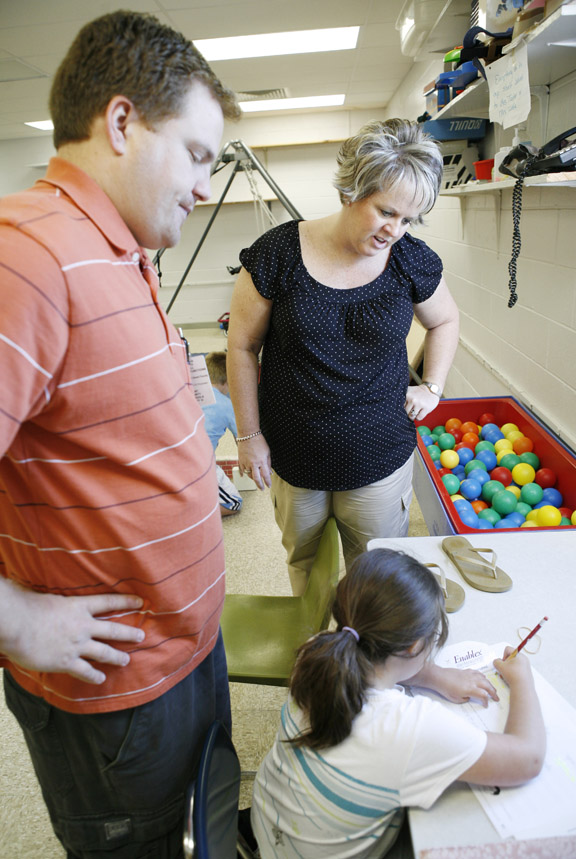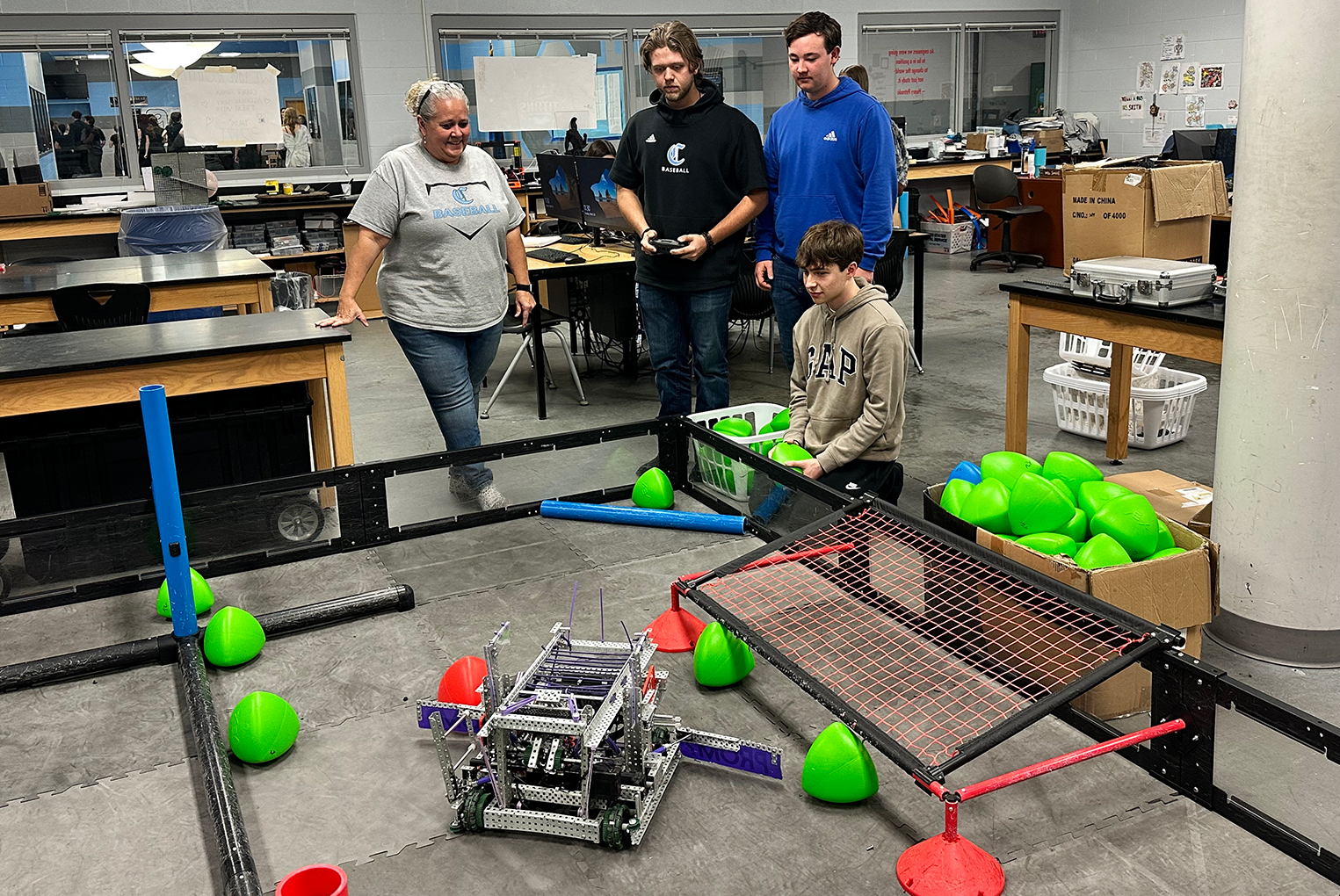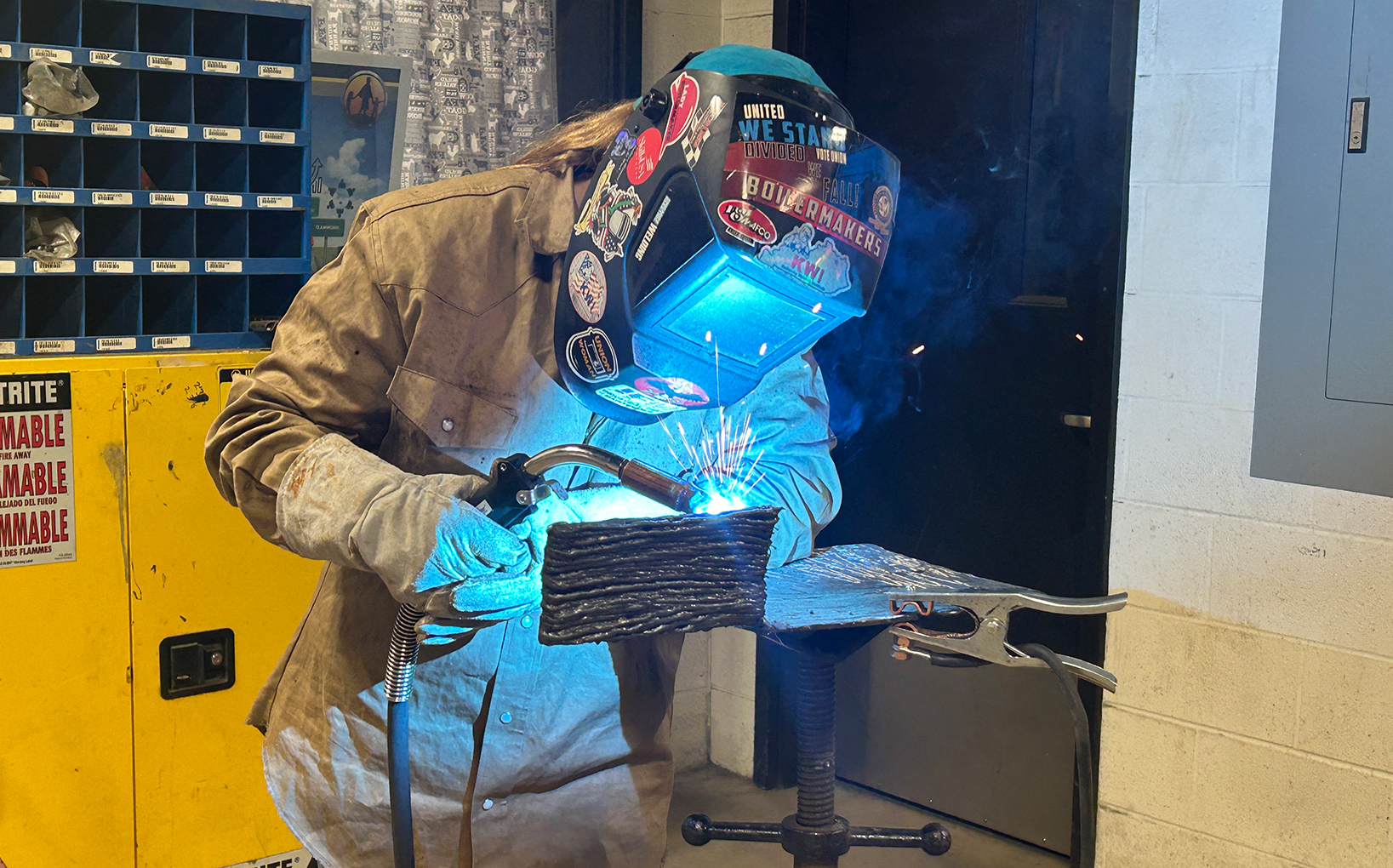
Teachers Daniel Pagan and Stephanie Arnold work with a student in the sensory room at Dry Ridge Elementary School (Grant County) May 4, 2010. Pagan is one of the five teachers Arnold has mentored in the Kentucky Teacher Internship Program, which is designed to provide assistance to new teachers. Photo by Amy Wallot
By Matthew Tungate
Many teachers across Kentucky are walking into classrooms as professional teachers for the first time this month. Danny Pagan, who teaches students with special needs at Dry Ridge Elementary School (Grant County), wants them to know that no two days are ever the same.
“For me, every new day is like a canvas,” said the former graphic designer now in his fifth year teaching. “I will most definitely bring my paint brush and all my colors, yet the picture I paint may be different than the one I planned.”
First-grade teacher Stephanie Arnold was Pagan’s mentor at Dry Ridge Elementary. She wants new teachers to know that being a teacher is more than just standing in front of a classroom and teaching.
“It’s a profession in which things are constantly changing, and you must be able to adapt to change and learn and update new things repeatedly,” she said. “I think most teachers would admit that it is a profession that we feel rewarded daily as we see our students’ progress.”
Pagan is one of the five teachers Arnold has mentored in the Kentucky Teacher Internship Program (KTIP), which is designed to provide assistance to new teachers. Kentucky law requires that teachers with less than two years’ experience who are seeking initial certification serve a one-year internship. A three-member committee composed of the principal, resource teacher and university-appointed teacher educator guide and assess the intern’s progress throughout the first year of teaching.
Pagan said the KTIP was good to go through.
“I got the chance to polish certain skills and interact with three different observers who gave great insight to the lessons that I taught for them,” he said. “My mentor helped me with the whole process and what I would need to do to excel on all the guidelines for the whole program.”
Hope Phipps, an 8th-grade U.S. History teacher at Morgan County Middle School entering her second year teaching, said meeting KTIP requirements can be very stressful. She thanked her mentor, Allison Hembree, for keeping her from turning into a “basket case.”
“She helped guide me in a lot of the decisions that I had to make on things in class and how to deal with things that I shouldn’t have done,” Phipps said. “Being a first-year teacher, I was always second-guessing myself, and with Mrs. Hembree there to help me, I always felt confident in the choices I made.”
Tom Knight, who is entering his second year teaching special education at Graves County High School, agreed that KTIP was worthwhile and that he benefited from the help of his mentor, Kelly Hlava.
“My KTIP mentor was more than willing to tell me the truth about my abilities,” he said. “She explained what I was doing right and what areas I needed improvement, then followed up, frequently answering my questions. I had a lot of questions.”
The teachers’ mentors, though asked separately, named the same common issues with which new teachers struggle.
“Some of the common things that I have seen new teachers needing more work on include classroom management, learning to transition from one activity to the next and being prepared,” said Arnold, who is beginning her 19th year of teaching and 12th at Dry Ridge Elementary.
Hlava, a special education teacher at Graves County High School entering her 16th year, said new teachers are either non-confrontational or nit-pickey.
“The non-confrontational teacher is typically a pushover with students and is willing to ‘bend’ his own classroom rules on a regular basis. This inconsistency often breeds chaos,” she said. “The nit-picking teacher is one who spends more time on discipline than on instruction. When a teacher sets up too many classroom rules or is insecure with his own authority in the classroom, the result is a classroom filled with rebellious students.”
Hlava suggests teachers work with students to develop three or four classroom rules and the consequences for not following them. She suggests handling minor rules violations one-on-one in the last few minutes of class and in private, if possible. She also suggests building rapport with students by learning about them and talking to them outside of the classroom.
Hembree, a 7th-grade social studies teacher at Morgan County Middle School beginning her 17th year, said many new teachers are caught off-guard by the lack of support a student may receive at home.
“So many times first-year teachers think parents will always be supportive of the child and the teacher, but it doesn’t always work out that way,” she said.
Arnold said many discipline problems are caused by new teachers’ common problem: a lack of instructional planning with supporting activities.
“It is very difficult for interns to realize how many activities must be prepared or planned for each day, depending, of course, on the grade level,” she said.
Arnold said new teachers also are consistently surprised by the wide range of ability levels in their classrooms.
“It’s your job to teach all these different levels at the same time,” she said. “They are also faced with that student who ‘just isn’t getting it,’ yet don’t qualify for extra services, so what do you do? It is a challenge that requires lots of creativity, planning and patience.”
Phipps said she was surprised how much students have changed since she was in school and offered a suggestions to new teachers as well.
“Don’t be afraid to ask advice from those in your school,” she said. “I can’t list the amount of time I spend talking with my vice principal and others in the building over discipline issues and just classroom issues in general. Their advice was invaluable to me.”



Leave A Comment